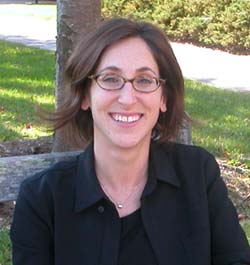|
|

| October 16, 2006 New Faculty Member Karen Zivi a Proponent of Service Learning Karen Zivi, a political scientist and Jepson’s newest faculty member, has been integrating academics with community service for years. So when she read the Jepson job posting for a political theorist who could teach courses like “Justice and Civil Society” (formerly “Service to Society”) with a substantial service-learning component, she eagerly applied for the job. Zivi weaved service learning into her undergraduate studies at the University of Virginia. She fully immersed herself in it immediately following her college graduation in May 1991 by taking a job with Campus Compact. A national coalition represented on more than 1000 college and university campuses, Campus Compact promotes community service, civic engagement and service learning in higher education. Zivi continued working for Campus Compact on initiatives such as the Youth Vote 2000 Project while pursuing first a master’s and then a doctoral degree in political science at Rutgers University. She also taught several service-learning classes as a graduate student at Rutgers on subjects ranging from the societal impact of HIV and AIDS to general political theory and citizenship. After receiving her doctoral degree, Zivi taught courses in Harvard’s social studies program. In August 2003, she and husband Michael Moody, who holds a doctorate in sociology from Princeton, moved to Los Angeles to teach at the University of Southern California. In their free time, Zivi and Moody balanced outdoor activities such as hiking, camping and skiing in the nearby mountains with trips to the spa. Zivi also took up yoga. “I guess Southern California had a little bit of an effect on this East Coast girl,” said Zivi, who grew up in New Jersey. Zivi moved to Richmond two months ago just before the start of the fall semester. “I already feel comfortable in Richmond,” she said, “and I’m looking forward to getting to know the city. There’s plenty to do here, especially with Washington, Charlottesville and Williamsburg so close by.” She’s also excited about teaching in Jepson’s interdisciplinary setting. “My natural inclination is to think and teach across disciplines,” Zivi said. “Political thought, especially feminist political thought [one of Zivi’s areas of expertise], is quite interdisciplinary itself.” The experiential-education component of the Jepson curriculum appeals to Zivi as well. “I’m a big fan of service learning for a number of reasons,” she said. “First, I think some people learn better by doing rather than by reading and discussing. “Second, as someone who teaches political theory with an emphasis on democratic theory, I see service learning as part of the practice of citizenship. Service learning expands students’ understanding of the community of which they are a part and challenges them to take a more active role in assessing and possibly changing the world around them. “Third, the particular kind of service learning required by the ‘Justice and Civil Society’ course—this face-to-face interaction—exposes students to members of communities in need in ways that humanize and personalize big social problems that might otherwise seem overwhelming or quite distant.” |
